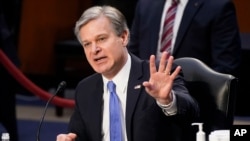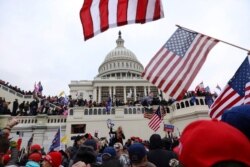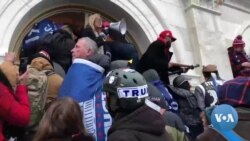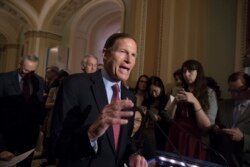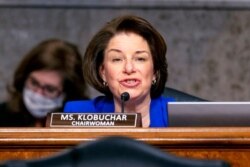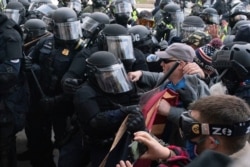A U.S. Senate committee is set to hear Wednesday from defense, justice and homeland security officials about the failures of January 6 when supporters of then-President Donald Trump attacked the U.S. Capitol.
Among those scheduled to testify before the Senate Homeland Security and Governmental Affairs Committee is Maj. Gen. William Walker, the commanding general of the D.C. National Guard, whose forces are the subject of questions about security preparations and response to the attack.
On Tuesday, FBI Director Christopher Wray defended the bureau against criticism that it missed warning signs about the assault and failed to adequately sound the alarm about the possibility of violence by Trump supporters.
At the same time, Wray, in his first congressional appearance since the riot, disputed assertions promoted by some on the right that far-left activists masquerading as Trump supporters were involved in the deadly attack.
The attack left five people dead, including a Capitol Police officer, and more than 100 other officers injured. A nationwide manhunt in the aftermath of the insurrection has led to the arrest of more than 270 rioters, including 33 members of anti-government militias and other far-right groups.
Testifying before the Senate Judiciary Committee, Wray said the FBI took multiple steps to ensure a “raw” intelligence report warning about the possibility of a violent attack on the Capitol — the seat of the U.S. Congress — reached key law enforcement agencies the day before. The January 5 report, prepared by the FBI’s Norfolk, Virginia, field office, cited online extremist chatter about the possibility of violence and “war.”
WATCH: Wray's Senate testimony:
The FBI typically verifies such raw information before sharing it with law enforcement agencies. But in this case, Wray said, the threat was concerning and “specific enough” that the FBI decided to share it with the Capitol Police, the Washington Metropolitan Police Department and other law enforcement agencies as soon as possible.
“We did pass that on to the people in the best position to take action on the threat. Not one, not two, but three different ways,” Wray said.
Yet the report was not flagged for top officials responsible for securing the Capitol, hose officials testified last week, raising questions about a breakdown in intelligence- sharing.
The officials — the former chief of Capitol Police, and the former sergeants-at- arms for the House and the Senate — told lawmakers that while they had prepared for a large and potentially violent protest outside the Capitol on January 6, they had not been warned about the possibility of a violent takeover.
Asked by Democratic Sen. Richard Blumenthal why the FBI failed to “sound the alarm in some more visible and ringing way,” Wray, calling the attack an act of domestic terrorism, said the FBI had repeatedly warned about the threat in recent months.
“The FBI over the course of 2020 put out a number of intelligence products specifically warning about domestic violent extremism. Including specifically warning about it in connection with the election. Including specifically warning about that threat in relation to the election and continuing past the election itself and up through the inauguration,” Wray said.
In December, for example, the FBI and the Department of Homeland Security warned that “terrorist-inspired individuals and homegrown violent extremists may be encouraged or inspired to target public events or places.”
In the lead-up to January 6, Wray said the FBI had been tracking a “large amount of information” about people intending to travel to Washington and the potential for violence. A major challenge for the FBI is separating extremist online rhetoric that is “aspirational” from “intentional,” he said.
Democratic Sen. Amy Klobuchar said the FBI report appeared to be “beyond aspirational.”
“It seems like some of these reports that we now know exist out there were specific in terms of these plans that were going on,” she said.
She asked Wray if he felt sending an email to other law enforcement agencies was a sufficiently aggressive response to an alarming report that even Wray was not shown at the time.
Wray said the January 6 attack was not “an isolated event” but rather one that was rooted in the growing threat of domestic violent extremism confronting the country in recent years.
“The problem of domestic terrorism has been metastasizing across the country for a long time now, and it’s not going away anytime soon,” he said. “At the FBI, we’ve been sounding the alarm on it for a number of years now.”
The FBI is currently investigating about 2,000 domestic terrorism cases, most of them involving white supremacists — up from 1,400 at the end of last year, and from 1,000 in 2017, according to Wray.
In the nearly two months since the January 6 attack, the FBI has arrested more than 270 people on federal charges related to the Capitol breach, with additional people arrested almost daily. Local authorities have arrested an additional 30 or so people.
Capitol Police estimate that about 800 Trump supporters stormed the building during the riot.
Wray said “aspects” of the Capitol breach were planned and coordinated in advance, with some of the rioters traveling to Washington with “plans and intentions” to carry out an attack.
“Some of the coordination appears to have been coordinated travel, coordinated meeting up, coordinated in terms of what kind of gear they may be bringing with them,” Wray said.
Of the 257 people charged with federal offenses to date, 33 allegedly belonged to anti-government militia groups and other far-right groups, according to a new report released by The George Washington University’s Program on Extremism.
Wray was asked repeatedly whether the FBI had any evidence that the attack was organized by “fake Trump protesters,” left-wing anti-fascists and anarchists.
"We have not, to date, seen any evidence of anarchist violent extremists or people subscribing to ‘antifa’ in connection with the 6th,” Wray said. “That doesn’t mean we’re not looking and will continue to look. But at the moment, we have not seen that."
The baseless claim that the attack on the Capitol was a “false flag” operation carried out by antifa activists started soon after the riot ended. Right-wing talk show hosts, as well as some Republican members of Congress, have continued to promote the theory, despite previous denials by the FBI.
During last week’s Senate hearing on the Capitol breach, Republican Sen. Ron Johnson repeated the claim, saying “fake Trump protesters” were among the people that “probably planned this.”




